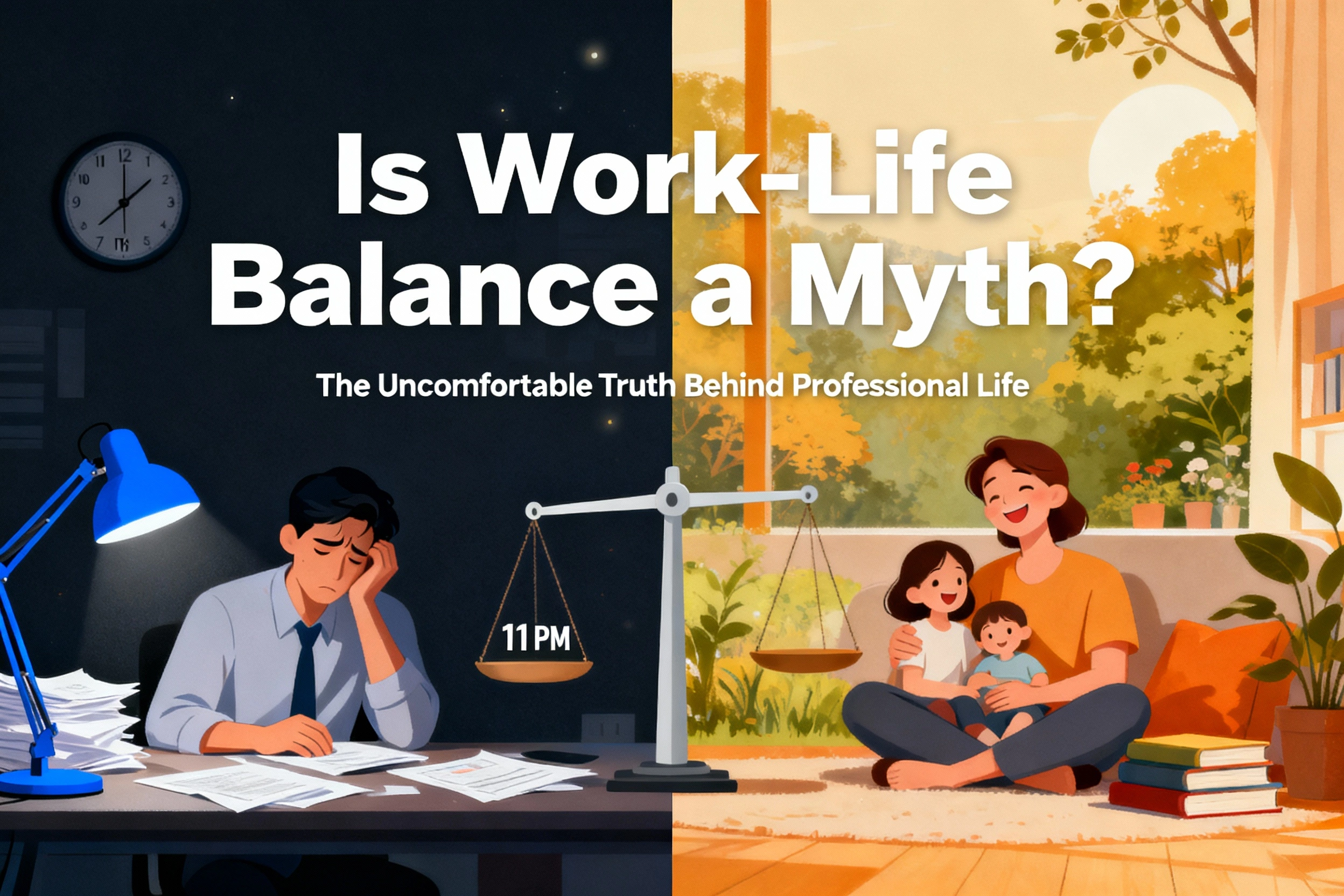Is Work Life Balance a Myth? 60% of Professionals Struggle With Work-Life Balance!
In today’s hyper-connected world, “work-life balance” has become one of the most debated buzzwords. From tech professionals to teachers, from doctors to entrepreneurs, everyone is chasing that elusive equilibrium between career and personal life. But many ask the tough question — “Is work life balance a myth?” The question isn’t new. But the answer is more complicated than a simple “yes” or “no.” Let’s discuss it more.
Is Work Life Balance a Myth or Reality?
The real question is: Is work-life balance a myth or reality, or have we just been approaching it all wrong?
The real paradox of work-life balance is that we’re all buying a fantasy while living a reality that contradicts everything we preach. Is it truly possible to maintain a healthy divide between our professional commitments and personal life. Or is the idea itself unrealistic and a comforting illusion we’re told to aspire to?
The Digital Connectivity Makes Work Life Balance a Myth
The rise of digital connectivity has turned the 9 to 5 job into a 24/7 commitment. In a digital age the work mode is always on and never off. Professionals are expected to respond to messages, emails, and status pings even after dinner.
Take the IT industry for example. A project manager at Infosys or TCS often deals with global clients across time zones. This means calls at midnight or early morning. Though companies encourage “flexibility,” it often translates to round-the-clock availability.
As one software engineer candidly puts it — “I don’t work from home anymore. I live at work.” This perfectly sums up why work life balance is a myth for many professionals.
Why Work Life Balance Is a Myth?
The work life balance is a myth because the math of available hours doesn’t add up. Let’s start with a straight example. If you work 8 hours, sleep 8 hours, and have 8 hours for “life” the math looks fair. Perfect balance, right?
Except:
Your 8-hour workday starts when you check emails at 7:30 AM from home (before the actual workday begins). The work commute adds 1-2 hours. You scroll work slack at 10 PM because a deadline is looming. You bring work stress home even when you’re not working.
At the end, 8 hours of work becomes 10-12 hours of work-adjacent time. Your “8 hours of life” becomes 4-6 hours of actual life. This isn’t balance. This is a carefully constructed myth that companies sell to keep you motivated while you burn out.
Industries Where Work Life Balance is Nearly Impossible
Let’s look at the major industries or work spaces where work life balance is not practically possible due to their nature of demanding work and responsibilities:
Is Work Life Balance a Myth in Corporate?
Let’s understand it with an example: A company has a testimonial for its work culture saying, “Work-life balance is central to our culture. We believe in sustainable careers.”
But, in reality the employees who work in the same company, has to work 80-100 hours per week. Most of them haven’t taken a vacation in 18 months. They eat lunch at their desk and answering emails until midnight. The corporate culture glorifies overwork as dedication.
When asked if work-life balance is a myth, they say with a smug: “It’s not a myth. It’s a lie we tell candidates to recruit them.”
Is Work Life Balance Possible in Healthcare?
Healthcare is noble as well as demanding profession. An emergency doctor’s usual shift can be 12-hour shifts for 3 days a week. It sounds sustainable being in a responsible profession of healthcare. Now, look at the actual math: The 12-hour shift extends to 14 hours with handover and administrative work. On-call nights happens 1-2 per week (interrupted sleep, anxiety). Additionally, continuing education takes 5-10 hours per week.
So the doctor is working ~60+ hours per week while being paid for 36 hours. So, a work life balance is a myth and not a for anyone in healthcare. And, society expects that sacrifice from a noble profession.
Even the education profession is no exception. Teachers, too, have to adapt overnight to exam season, digital learning, preparing lessons late into the night while managing their own households. These professions show that passion often overrides balance which may lead to emotional fatigue, burnout, and reduced personal time.
Is Work Life Balance Possible in Law & Legal Services?
The billable hours at Indian legal services and Police department, but the actual working hours are beyond that. A lawyer at a top law firms in India must log 2,200+ billable hours per year. That’s roughly 50 hours per week of paid work. Add meetings, admin, CLE credits, and you’re at 65+ hours easily.
Work-life balance can never be a reality in law and legal services in India. The Law Associates and police force often work until midnight 24/7. One associate bill 50 hours and work 70. The other 20 hours are unreimbursed mentoring, training, and expectations.
Work-Life Balance in Media & Journalism
A news organization operates 24/7 where everything is on priority and everyone stays on their toes all the time. Breaking news means your schedules are cancelled. Your vacation ends when a story breaks and you have to check your phone compulsively.
Work-life balance reality: The average tenure of media person and journalists is 7-10 years before burnout forces exit.
Work-Life Balance in Sales & Customer Service
Call center agents, insurance agents, real estate brokers — all face relentless pressure. A real estate broker in Mumbai works 12 hours per day, 6 days per week. Client calls come on Sundays as being the only day available to look for properties. Properties must be shown at client convenience.
Work-life balance reality: Work-life balance is impossible when your customers’ schedule is your schedule.
The Industries Where Work Life Balance is a Reality
Here are some industries where work life balance is not a myth but actually a reality:
1. Government & Public Administration
People get defined hours per day along with perks, like pension benefits, HRA, Gratuity, job security, etc. A government officer works 9 AM – 5 PM every day. There’s no expectation of email after hours and weekends are sacred. Work-life balance is reality and it’s more achievable in government jobs than private sector.
2. Academia
Professors and teachers have autonomy over their schedules. Yes, there’s research pressure and grading, but you can batch-process work. The work-life balance is reality in academic sector but not in the entry-level positions, like PhD students where the job demand is high.
3. IT & Software Development (In Some Companies)
Tech companies like Microsoft, Google, and Adobe have started recognizing burnout. They offer flexible work-from-home, flexible hours onsite, mental health support, and inclusive work spaces with better lifestyle options are their corporate premises.
Work-life balance is a better than many other corporates in finance and consulting sector.
Why Work Life Balance is a Myth in Indian Context: The Cultural Factor
In India, professional identity often defines personal worth in the society. It’s a cultural as well as regional values attached to it. Families proudly associate success with long working hours and high-paying jobs. This cultural conditioning adds guilt to those seeking more personal time. It also creates a divide among the people from different ideologies about working hours.
The professional growth at management levels are also directly associated to the hours someone stays available at workplace. However, Gen Z professionals are changing this mindset. They prioritize well-being, flexibility, and purpose-driven work, valuing “life” as much as “work.” This generational shift might finally turn the question “Is work life balance a myth?” into a challenge we can solve, not just debate.
Work Life Balance is a Myth With Hustle Ideology
“Grind now, shine later.” That’s the unofficial motto of corporate India today. In cities like Mumbai, Gurugram, and Bengaluru, professionals spend an average of 2 hours daily commuting, in addition to long work hours. Even in startups where “flexible culture” is advertised, long workweeks and blurred weekends are common.
Elon Musk famously said: “Nobody ever changed the world on 40 hours a week.” While this mindset drives innovation, it also perpetuates the notion that work life balance is a myth for those chasing success in high-performance environments.
Work Life Balance: Myth or Reality
Work-life balance is a myth for some and reality for others. It depends largely on individual priorities, company culture, and career stage. For example, for early-career professionals, long hours may feel necessary to build credibility in the beginning phase of their career.
For mid-career and senior level individuals, this balance often becomes a conscious choice. They start setting boundaries, taking mental health breaks, and negotiate for hybrid work models as a choice.
Companies like Microsoft Japan, Google, and Zomato India have experimented with shorter workweeks and “wellness leaves,” showing that balance isn’t impossible. But, it requires systemic support, not just individual effort.
Prepare for CAT GDPI Topics
Now, that you have crossed the first hurdle of cracking the CAT exam, it’s time to focus on the next stage. It’s about preparing for Group Discussion (GD), Written Ability Test (WAT) & Personal Interview (PI) round from the IIMs and other prestigious B-Schools like XLRI, FMS, MDI, SP Jain, NMIMS and SIBM.
During the GD-WAT-PI selection process, you compete with the best of the best and it is but natural that you would want to be coached by the leading experts in the field of Personality development and GDPI training.
Also read, How to prepare for CAT GDPI Topics
Is Work Life Balance Achievable?
Yes, it can be achieved with the help of little changes in habits and choices. Though, labour laws will also help a lot but that is a long road ahead.
- Personal boundaries: You can turn off notifications after 6 PM and say “no” to extra projects in the evening just before when your shift is about to end. You can protect your weekends.
- Right Job Fit: Not all jobs demand 60-hour weeks. Teaching, government roles, and structured corporate jobs allow real balance. You can choose or shift to better career opportunities. Work that aligns with your values requires less balance.
- Health and Sustainability: Studies show that employees with better balance have higher productivity, lower attrition, and better mental health. It benefits everyone.
- Senior Leverage: Once established in your career, you have leverage to negotiate better terms with working hours and shift. You can reduce the burnout with better terms on appointment letter.
Reimagining Work-Life Balance: Work Life Integration Over Work Life Balance
Perhaps the idea of a perfect balance between work and life is outdated. Modern professionals are embracing work-life integration instead. That means accepting that work and personal life will overlap, but one can set boundaries, like:
- No emails after 8 PM
- Dedicated family/personal time on weekends
- Flexible leave for health or caregiving
Organizations like Google and TCS have introduced “digital detox” initiatives encouraging employees to disconnect after hours. These small cultural shifts help transform the myth of balance into a more achievable reality.






